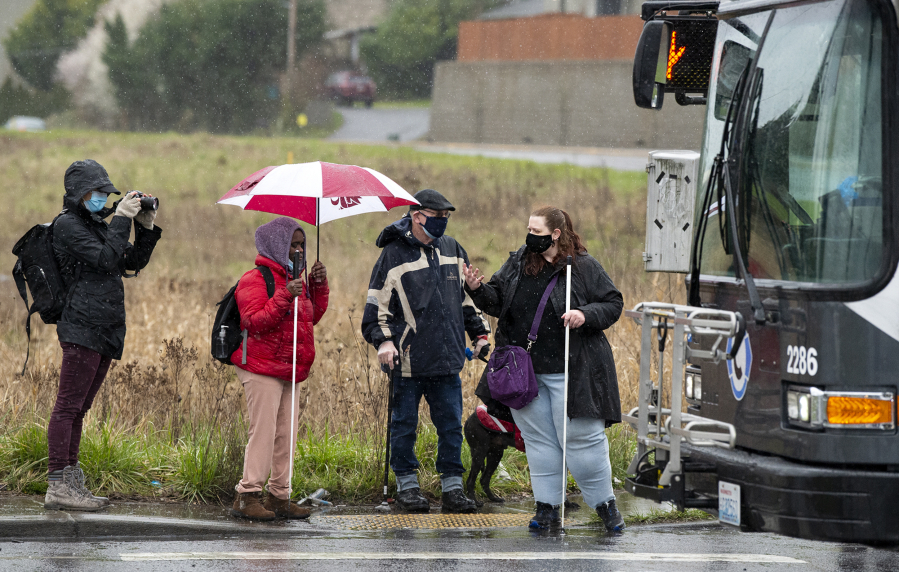A group of Vancouver residents joined representatives from Disability Rights Washington and Front and Centered at a press conference Thursday afternoon to draw attention to the challenges faced by public transit riders in rural Clark County, particularly riders with disabilities.
The goal was to highlight “the dire need to fund transit and pedestrian infrastructure, investments that should take priority over building new highways,” according to a press release from Anna Zivarts, director of the Disability Mobility Initiative at Disability Rights Washington.
The group staged its event at a northbound bus stop on C-Tran’s Route 25, on Northeast St. Johns Road just north of the intersection with Northeast Minnehaha Street. The stop is on a segment of the street that lacks a sidewalk.
Chris Higley, a longtime Clark County resident, said she often struggles with unpaved sidewalk areas when trying to catch the bus, particular when it rains and the uneven ground becomes muddy.
“You almost feel like you’re safer walking on the edge of the road, which isn’t safe at all,” she said.
She also criticized the speed of traffic on St. Johns Road and its southbound counterpart, and said she often fears getting hit by cars while trying to get to bus stops.
Vancouver resident Harry Kiick, who had to give up driving years ago due to a spinal injury, discussed the importance of sidewalks and curb cuts for his own mobility. Kiick serves as chair of the Citizens Advisory Committee for C-Tran.
“What you see here, this is unfinished business,” he said, gesturing to the grassy turf surrounding the bus stop.
Vancouver resident Betty Fitzpatrick called attention to the crosswalks at the nearby intersection, which lack accessible features such as audio cues for visually impaired pedestrians. Fitzpatrick, who is blind, said she’s spent years advocating for upgrades but has had no success so far.
Another rider, Abby Griffith, discussed the difficulty she faces when taking the bus to attend class at the Washington State University Vancouver campus. Griffith, who is blind, said she starts her trip by walking at least 10 minutes to reach the closest bus stop to her apartment complex.
The two-hour trip requires two transfers, she said, and can become a three-hour journey if she happens to miss one of the buses.
“Getting to my university by driving is under 20 minutes,” she said. “It takes me over two hours. That shouldn’t be happening.”
The press conference was the second in a series that Disability Rights Washington and Front and Centered plan to hold throughout the state during the current legislative session as part of a campaign to secure more funding to make public transit accessible to economically disadvantaged communities, communities of color and riders with disabilities.
The groups held their first conference last week in Tacoma, and additional events are planned in Bothell and Bellingham, Zivarts said.
The effort ties into an ongoing project from the two organizations to create a “Transportation Access Storymap,” an interactive tool that takes the stories of riders like Fitzpatrick and Griffith and places them on a statewide map at disabilityrightswa.org/storymap.
C-Tran has several bus stops at sites that have a limited easement or are on land outside of the agency’s control, such as suburban subdivisions and city- or county-owned right of way, according to Chris Selk, the agency’s director of communication and customer experience.
Some of those stops date back decades, she wrote in an email, and stops that predate the Americans with Disabilities Act can be difficult to modify, although she added that all stops in the system are monitored by staff and “C-Tran works closely with the City of Vancouver and Clark County on any need for repairs or sidewalk upgrades.”
“C-Tran absolutely supports Disability Rights Washington’s mission to obtain more infrastructure dollars to help address these issues,” she wrote.




